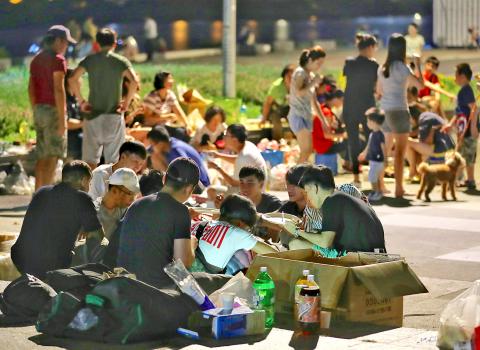The Taipei City Government is mulling enforcing a ban on barbecuing at riverside parks and other public sites, but would not do so until it has held more discussions on the issue or conducted an online poll.
While barbecuing has become a tradition for the Mid-Autumn Festival in Taiwan in recent years, city regulations ban barbecuing in city parks or on public lawns.
The city government has issued notices about designated barbecue sites in riverside parks ahead of the holiday for more than a decade, but did not do so this year.

Photo: CNA
Instead it only posted a notice on Thursday on the Hydraulic Engineering Office’s Frequently Asked Questions Web site, which stated that barbecuing would be allowed in 19 areas, including seven that are open for barbecues year-round and 12 areas where it would be allowed over the Mid-Autumn Festival holiday weekend.
The office yesterday said that it had decided not to widely publicize the announcement this year.
Since the decision was made 10 years ago to open up designated areas in riverside parks for Mid-Autumn Festival barbecues, picnickers in the parks often failed to clean-up after themselves and remove their garbage, the office said.
It had to increase the number of personnel on duty during the festival to persuade people to stay within the designated areas and clean up afterward, it said.
Considering the negative impact of PM2.5 pollution — particulate matter with a diameter of 2.5 micrometers or less — on health and riverside ecology, and the city’s carbon reduction goals, the office it has been considering whether to continue opening riverside parks to holiday barbecues, it said.
It is to work on reducing the number of areas where barbecues are allowed or even imposing a total ban, but more discussion is needed, and it might ask city residents to decide through the online i-Voting system, the office said.
Additional reporting by CNA

A magnitude 7.0 earthquake struck off Yilan at 11:05pm yesterday, the Central Weather Administration (CWA) said. The epicenter was located at sea, about 32.3km east of Yilan County Hall, at a depth of 72.8km, CWA data showed There were no immediate reports of damage. The intensity of the quake, which gauges the actual effect of a seismic event, measured 4 in Yilan County area on Taiwan’s seven-tier intensity scale, the data showed. It measured 4 in other parts of eastern, northern and central Taiwan as well as Tainan, and 3 in Kaohsiung and Pingtung County, and 2 in Lienchiang and Penghu counties and 1

FOREIGN INTERFERENCE: Beijing would likely intensify public opinion warfare in next year’s local elections to prevent Lai from getting re-elected, the ‘Yomiuri Shimbun’ said Internal documents from a Chinese artificial intelligence (AI) company indicated that China has been using the technology to intervene in foreign elections, including propaganda targeting Taiwan’s local elections next year and presidential elections in 2028, a Japanese newspaper reported yesterday. The Institute of National Security of Vanderbilt University obtained nearly 400 pages of documents from GoLaxy, a company with ties to the Chinese government, and found evidence that it had apparently deployed sophisticated, AI-driven propaganda campaigns in Hong Kong and Taiwan to shape public opinion, the Yomiuri Shimbun reported. GoLaxy provides insights, situation analysis and public opinion-shaping technology by conducting network surveillance

‘POLITICAL GAME’: DPP lawmakers said the motion would not meet the legislative threshold needed, and accused the KMT and the TPP of trivializing the Constitution The Legislative Yuan yesterday approved a motion to initiate impeachment proceedings against President William Lai (賴清德), saying he had undermined Taiwan’s constitutional order and democracy. The motion was approved 61-50 by lawmakers from the main opposition Chinese Nationalist Party (KMT) and the smaller Taiwan People’s Party (TPP), who together hold a legislative majority. Under the motion, a roll call vote for impeachment would be held on May 19 next year, after various hearings are held and Lai is given the chance to defend himself. The move came after Lai on Monday last week did not promulgate an amendment passed by the legislature that

AFTERMATH: The Taipei City Government said it received 39 minor incident reports including gas leaks, water leaks and outages, and a damaged traffic signal A magnitude 7.0 earthquake struck off Taiwan’s northeastern coast late on Saturday, producing only two major aftershocks as of yesterday noon, the Central Weather Administration (CWA) said. The limited aftershocks contrast with last year’s major earthquake in Hualien County, as Saturday’s earthquake occurred at a greater depth in a subduction zone. Saturday’s earthquake struck at 11:05pm, with its hypocenter about 32.3km east of Yilan County Hall, at a depth of 72.8km. Shaking was felt in 17 administrative regions north of Tainan and in eastern Taiwan, reaching intensity level 4 on Taiwan’s seven-tier seismic scale, the CWA said. In Hualien, the